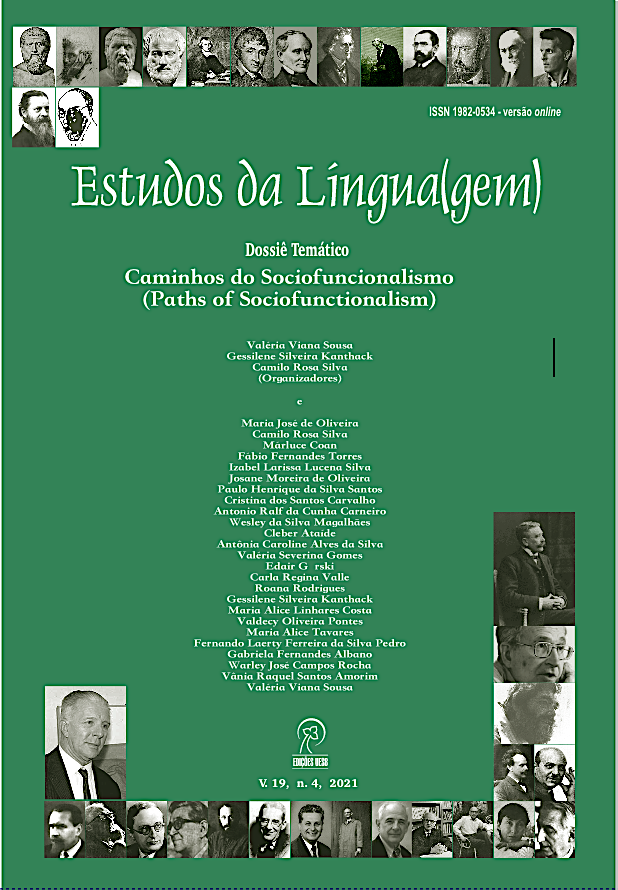The accusative strategies of 2nd person in romantic personal letters from the Pernambuco: a study through the Historical Sociolinguistics
DOI:
https://doi.org/10.22481/el.v19i4.8171Keywords:
Carta de amor., Estratégias acusativas., Tradição discursiva., Sociolinguística Histórica.Abstract
This article is part of the recent studies on the history of Brazilian Portuguese from the perspective of Historical Sociolinguistics. Our aim is to analyze the accusatory strategies, based on the grammaticalization of ‘você' as second-person pronoun, in romantic personal letters exchanged between individuals from the sertão region in the 1950s. The initial questions that instigate the investigation are the following: i) how did ‘você’, in the accusative case function, get implemented in the second person paradigm? And how did the clitic ‘te' still resist as an accusative strategy in face of the third person paradigm forms? ii) Which morphosyntactic contexts favor the occurrence of alternating forms in the accusative case function in the post-verbal position? The previous researches carried out by Lopes et al. (2018), Gomes; Lopes (2014) and Ataíde and Lima (2018) complement the theoretical and methodological support offered by the Historical Sociolinguistics perspective as proposed by Conde Silvestre (2007) and the Discursive Tradition model developed by Kabatek (2006, 2012); Andrade; Gomes (2018) and Ataíde (2020). The results of the analysis point to the confirmation of the hypothesis of Lopes et al. (2018) regarding the resistance of the clitic 'te' in the accusative case function. With regard to the position of the clitic, we found that proclisis is the preferred position for the accusative to be placed by the missivists and that the contexts favoring the enclisis were the beginning of the sentence and when the accusative was the pronoun ‘você’.
Downloads
References
ATAÍDE, C. A.; LIMA, T. J. S. A variação diatópica dos pronomes pessoais Tu e Você em cartas de amor do sertão pernambucano do século XX. LaborHistórico, v. 4, n. 2, 2018. p. 92-103. Disponível em: https://doi.org/10.24206/lh.v4i2.17500.
______. Aspectos sócio-históricos dos manuscritos e impressos pernambucanos. Palimpsesto: Revista do Programa de Pós-Graduação em Letras da UERJ, v. 17, n. 28, 2019. p. 72-103. Disponível em: https://doi.org/10.12957/palimpsesto.2018.42148.
______. A constituição de corpora sóciohistóricos do português brasileiro: edições de cartas pessoais e o modelo de Tradição Discursiva. Revista Diálogos. UFMT, V. 8, n. 2, p. 01-21, 2020. ISSN 2319-0825.
ANDRADE, M. L. C. V. O.; GOMES, V. S. Tradições discursivas: reflexões conceituais. In: CASTILHO, Ataliba T. de; ANDRADE, Maria Lúcia C. V. O.; GOMES, Valéria Severina (Coord.). História do português brasileiro: Tradições discursivas do português brasileiro: Constituição e mudança dos gêneros discursivos. v.7. São Paulo: Contexto, 2018.
BROWN, P; GILMAN, A. The pronouns of power and solidarity. In: SEBEOK, T. Style in Language. Cambridge-Mass: MIT Press, 1960.
COSTA, A. C. Ação – Formulação – Tradição: A correspondência de Câmara Cascudo a Mário de Andrade de 1924 a 1944, entre proximidade e distância comunicativa. In: MARTINS, M. A.; TAVARES, M. A. (Org.). História do português Brasileiro no Rio Grande do Norte: análise linguística e textual da correspondência de Luís da Câmara Cascudo a Mário de Andrade – 1924 a 1944. Natal: EDUFRN, 2012.
CONDE SILVESTRE, J. C. Sociolingüística histórica. Madrid, Gredos. 2007.
CYRINO, S. M. L. Observações sobre a aquisição de clíticos no português do Brasil, ms, 1992.
GOMES, V.S.; LOPES, C. R. S. Variação entre as formas dos paradigmas tu-você em cartas pernambucanas dos séculos XIX e XX. Revista do Gelne: UFRN, 2014.
______. Formas tratamentais em cartas escritas em Pernambuco (1869-1969): Tradição Discursiva e sociopragmática. Relin, n°21 Minas Gerais: Periódico em letras UFMG, 2016.
JÚLIO, T. S. L. “Maria eu observei nas palavras que mandastes dizer na carta que tu ainda duvidas do meu amor, mas você não tem razão de assim se expressar”: a variação dos pronomes pessoais Tu e Você em cartas de amor rurais do sertão pernambucano. Trabalho de conclusão de curso apresentado ao curso de Letras da UFRPE. Serra Talhada: UFRPE-UAST, 2018.
KABATEK, J. Tradições discursivas e mudança lingüística. In: LOBO, T. et al (Orgs.). Para a história do português brasileiro. Volume VI, Salvador: EDUFBA. 2006.
KABATEK, J. Tradição discursiva e gênero. In: LOBO, Tânia et al. (Org.). Rosae: linguística histórica, história das línguas e outras histórias. Salvador: EDUFBA, 2012, 579-588.
LOPES, C. R. S.; CAVALCANTE, S. A cronologia do voceamento no português brasileiro: expansão de você-sujeito e retenção do clítico-te. Revista Linguística, Madrid, v. 25, p. 30-65, 2011.
LOPES, C. R. S. et al. História do português brasileiro: mudança sintática das classes de palavra: perspectiva funcionalista. Edº 1, São Paulo: Contexto, 2018.
PESSOA, M. B. Da carta a outros gêneros textuais. In: DUARTE, Maria Eugênia Lamoglia; CALLOU, Dinah (Org.). Para a história do português brasileiro. Rio de Janeiro: UFRJ/LETRAS FAPERJ, 2002. p. 197-205.
SILVA, J. Q. G. Um estudo sobre o gênero carta pessoal: das práticas comunicativas aos indícios de interatividade na escrita dos textos. Tese de Doutorado apresentada à Universidade Federal de Minas Gerais, Belo Horizonte, 2002.
SOUZA, C. D. Eu te amo, eu lhe adoro, eu quero você: a variação das formas de acusativo de 2ª pessoa em cartas pessoais (1880-1980). Rio de Janeiro: UFRJ – FL, 2014.
Sites consultados:
http://ledoc.com.br. Acesso em 10 de maio de 2019.
https://informacoesdobrasil.com.br/rua/pe/triunfo/sitio-brejinho+6490. Acesso em 20 de junho de 2019.
Downloads
Published
How to Cite
Issue
Section
License
Copyright (c) 2021 Language Studies

This work is licensed under a Creative Commons Attribution 4.0 International License.

Estudos da Língua(gem) is licensed under a Creative Commons Attribution 4.0 International License.
Authors who publish in the journal Estudos da Língua (gem) agree with the following terms:
The journal Estudos de Língua(gem) maintains the copyrights of the contributions published. These rights include the publication of the contribution and make its content available for free through the portal.







